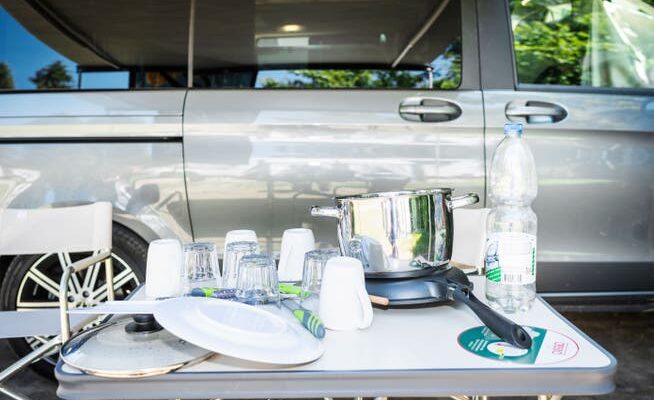A 68-year-old motorhome driver has been fined for spending the night in the Flaach nature reserve. But he didn’t want to accept that.
The 68-year-old argued that the 68-year-old only considered camping when tables and chairs were set up, as shown here.
If you are traveling with a mobile home, you are not allowed to camp everywhere. The man who was summoned to a court hearing at the Affoltern district court on Thursday morning should actually know this. Because he is a board member of an association that campaigns for the concerns of mobile home owners.
The case was only about a fine of 150 francs. Nevertheless, the 68-year-old man from the canton of Vaud took the trouble to challenge a penalty order. Why and what he expected from it remained unclear. The accused never showed up for the court hearing. After a short waiting period, the court declared the objection withdrawn. The penalty order will then become final.
On a Sunday in May 2021, the man had parked his mobile home from 5 p.m. to 9 a.m. the next morning in the “Ellikerbrücke” car park in Flaach. This is in a forest protection zone. According to the penalty order, he watched birds until around midnight and then slept in his mobile home. He did this even though camping in the nature reserve is strictly forbidden and the setting up of mobile homes in the municipality of Flaach outside of designated areas is also prohibited.
Due to his behavior, the accused at least accepted the illegal setting up of the mobile home and camping, so the governor’s office of the Andelfingen district argued. In addition to the fine of 150 francs, he was also charged 150 francs.
Is parking and camping the same?
The accused contested this. Although he admitted that he had parked the vehicle in the parking lot and stayed there overnight. He also knew that this parking lot was in a nature reserve, that camping was not allowed in the nature reserve and that camping was only permitted in designated areas.
In the objection, however, he took the position that parking a vehicle did not qualify as camping. In his opinion, something else had to be placed on the floor, such as tables or chairs. In addition, the signals are not legal, and it is not legal to punish him because of his mobile home. All vehicles under 3500 kilograms should be treated equally.
His arguments in this regard in court would have been interesting, but – as mentioned – he did not appear at all. And so the single judges didn’t have to decide about it either. In the penalty order, the governor’s office stated that the legal situation was clear: According to the Flaach police ordinance, the setting up of mobile homes outside of the designated areas is prohibited. And the suspect’s vehicle is a mobile home.
Municipal regulations apply
It is not even necessary for objects such as chairs and tables to be set up. Parking a mobile home with the intention of spending the night there already qualifies as setting it up. The jurisprudence of the Federal Supreme Court has also protected such prohibitions.
The accused should have known this, the governor continued to argue. The TCS website also points out that if you stay overnight in a mobile home or in another car, the regulations of the respective municipality apply and you should inquire locally. In this case, the ban is also signaled on site.
In the penalty order, the governor had also explicitly dealt with the meaning of the word “camping”. According to Wikipedia, it describes “a form of tourism in which holidaymakers spend the night in tents, hammocks, caravans, mobile homes, roof tents or converted vans”. The governor also quoted the explanation of words from the dictionary. This also shows that the setting up of tables or chairs is not necessary for the qualification as camping.
